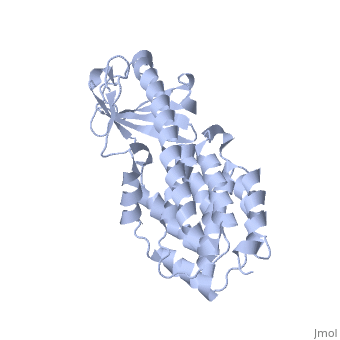1a87
From Proteopedia
(New page: 200px<br /><applet load="1a87" size="450" color="white" frame="true" align="right" spinBox="true" caption="1a87, resolution 3.1Å" /> '''COLICIN N'''<br /> =...) |
|||
| Line 1: | Line 1: | ||
| - | [[Image:1a87.gif|left|200px]]<br /><applet load="1a87" size=" | + | [[Image:1a87.gif|left|200px]]<br /><applet load="1a87" size="350" color="white" frame="true" align="right" spinBox="true" |
caption="1a87, resolution 3.1Å" /> | caption="1a87, resolution 3.1Å" /> | ||
'''COLICIN N'''<br /> | '''COLICIN N'''<br /> | ||
==Overview== | ==Overview== | ||
| - | BACKGROUND: Pore-forming colicins are water-soluble bacteriocins capable | + | BACKGROUND: Pore-forming colicins are water-soluble bacteriocins capable of binding to and translocating through the Escherichia coli cell envelope. They then undergo a transition to a transmembrane ion channel in the cytoplasmic membrane leading to bacterial death. Colicin N is the smallest pore-forming colicin known to date (40 kDa instead of the more usual 60 kDa) and the crystal structure of its membrane receptor, the porin OmpF, is already known. Structural knowledge of colicin N is therefore important for a molecular understanding of colicin toxicity and is relevant to toxic mechanisms in general. RESULTS: The crystal structure of colicin N reveals a novel receptor-binding domain containing a six-stranded antiparallel beta sheet wrapped around the 63 A long N-terminal alpha helix of the pore-forming domain. The pore-forming domain adopts a ten alpha-helix bundle that has been observed previously in the pore-forming domains of colicin A, la and E1. The translocation domain, however, does not appear to adopt any regular structure. Models for receptor binding and translocation through the outer membrane are proposed based on the structure and biochemical data. CONCLUSIONS: The colicin N-ompF system is now the structurally best-defined translocation pathway. Knowledge of the colicin N structure, coupled with the structure of its receptor, OmpF, and previously published biochemical data, limits the numerous possibilities of translocation and leads to a model in which the translocation domain inserts itself through the porin pore, the receptor-binding domain stays outside and the pore-forming domain translocates along the outer wall of the trimeric porin channel. |
==About this Structure== | ==About this Structure== | ||
| - | 1A87 is a [http://en.wikipedia.org/wiki/Single_protein Single protein] structure of sequence from [http://en.wikipedia.org/wiki/Escherichia_coli Escherichia coli]. Full crystallographic information is available from [http:// | + | 1A87 is a [http://en.wikipedia.org/wiki/Single_protein Single protein] structure of sequence from [http://en.wikipedia.org/wiki/Escherichia_coli Escherichia coli]. Full crystallographic information is available from [http://oca.weizmann.ac.il/oca-bin/ocashort?id=1A87 OCA]. |
==Reference== | ==Reference== | ||
| Line 13: | Line 13: | ||
[[Category: Escherichia coli]] | [[Category: Escherichia coli]] | ||
[[Category: Single protein]] | [[Category: Single protein]] | ||
| - | [[Category: Lakey, J | + | [[Category: Lakey, J H.]] |
| - | [[Category: Parker, M | + | [[Category: Parker, M W.]] |
[[Category: Pattus, F.]] | [[Category: Pattus, F.]] | ||
[[Category: Tsernoglou, D.]] | [[Category: Tsernoglou, D.]] | ||
| - | [[Category: Tucker, A | + | [[Category: Tucker, A D.]] |
| - | [[Category: Vetter, I | + | [[Category: Vetter, I R.]] |
[[Category: bacteriocin]] | [[Category: bacteriocin]] | ||
[[Category: pore-forming activity]] | [[Category: pore-forming activity]] | ||
[[Category: toxin]] | [[Category: toxin]] | ||
| - | ''Page seeded by [http:// | + | ''Page seeded by [http://oca.weizmann.ac.il/oca OCA ] on Thu Feb 21 11:41:56 2008'' |
Revision as of 09:41, 21 February 2008
|
COLICIN N
Overview
BACKGROUND: Pore-forming colicins are water-soluble bacteriocins capable of binding to and translocating through the Escherichia coli cell envelope. They then undergo a transition to a transmembrane ion channel in the cytoplasmic membrane leading to bacterial death. Colicin N is the smallest pore-forming colicin known to date (40 kDa instead of the more usual 60 kDa) and the crystal structure of its membrane receptor, the porin OmpF, is already known. Structural knowledge of colicin N is therefore important for a molecular understanding of colicin toxicity and is relevant to toxic mechanisms in general. RESULTS: The crystal structure of colicin N reveals a novel receptor-binding domain containing a six-stranded antiparallel beta sheet wrapped around the 63 A long N-terminal alpha helix of the pore-forming domain. The pore-forming domain adopts a ten alpha-helix bundle that has been observed previously in the pore-forming domains of colicin A, la and E1. The translocation domain, however, does not appear to adopt any regular structure. Models for receptor binding and translocation through the outer membrane are proposed based on the structure and biochemical data. CONCLUSIONS: The colicin N-ompF system is now the structurally best-defined translocation pathway. Knowledge of the colicin N structure, coupled with the structure of its receptor, OmpF, and previously published biochemical data, limits the numerous possibilities of translocation and leads to a model in which the translocation domain inserts itself through the porin pore, the receptor-binding domain stays outside and the pore-forming domain translocates along the outer wall of the trimeric porin channel.
About this Structure
1A87 is a Single protein structure of sequence from Escherichia coli. Full crystallographic information is available from OCA.
Reference
Crystal structure of a colicin N fragment suggests a model for toxicity., Vetter IR, Parker MW, Tucker AD, Lakey JH, Pattus F, Tsernoglou D, Structure. 1998 Jul 15;6(7):863-74. PMID:9687368
Page seeded by OCA on Thu Feb 21 11:41:56 2008

